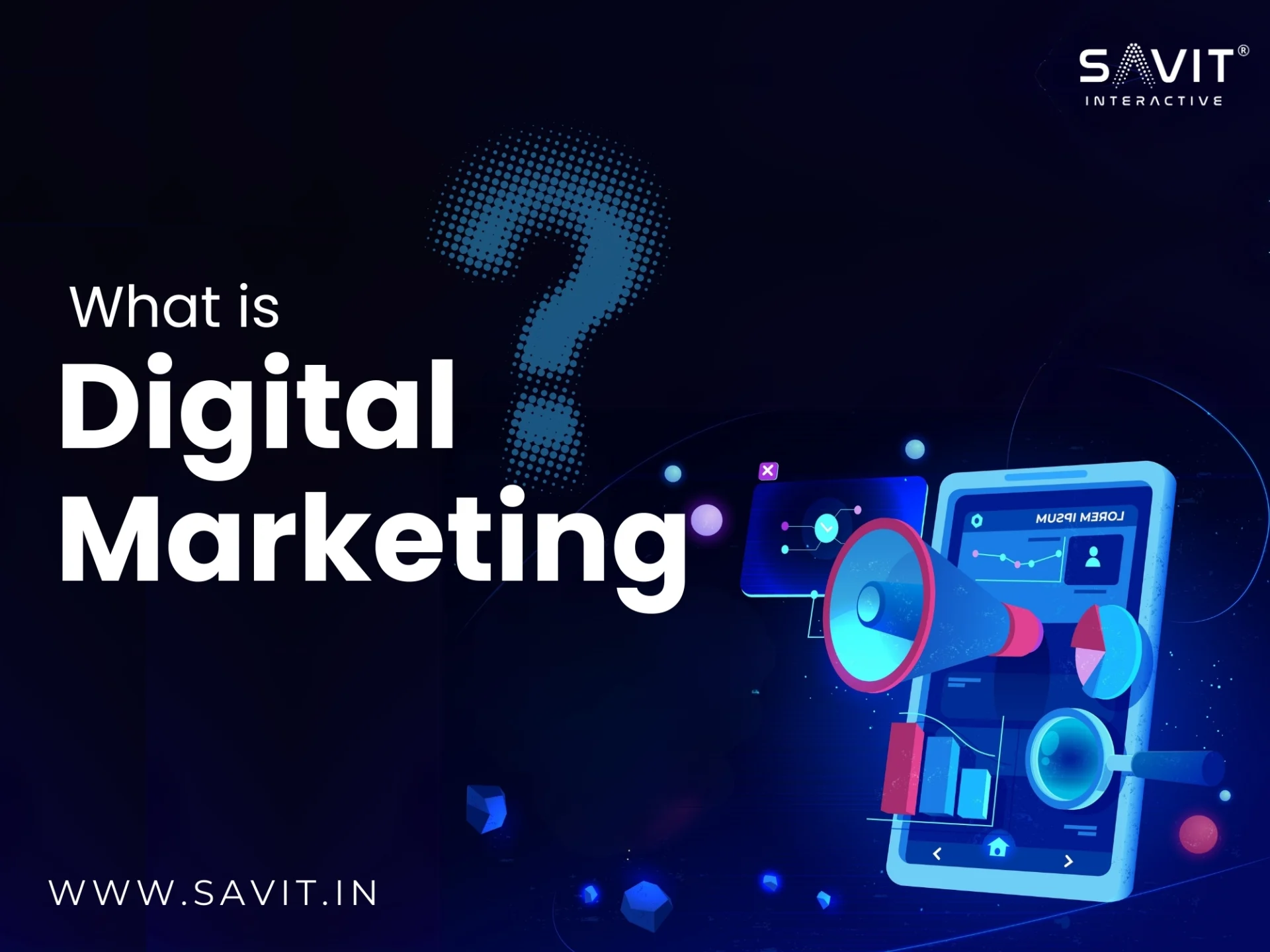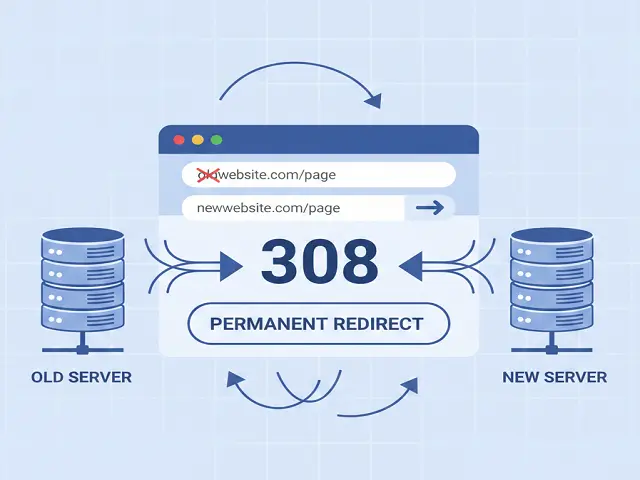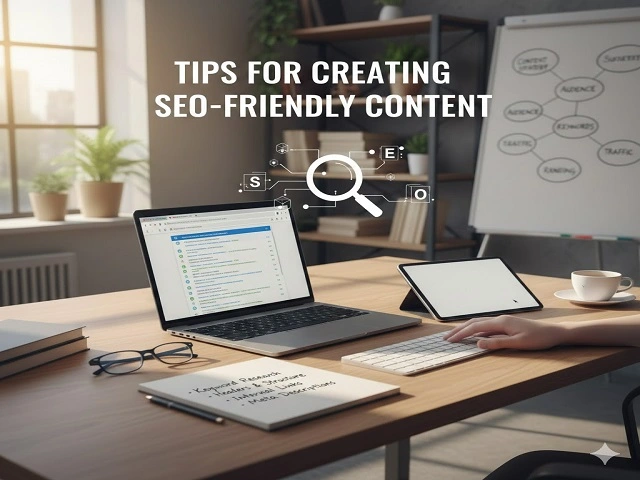Learn the fundamentals of digital marketing and how it aids businesses in growing online.
People spend a large part of their day online, whether shopping, learning, watching videos, or simply browsing. This shift in behavior has changed how businesses reach their customers. Instead of depending only on physical stores or word-of-mouth, most brands now focus on building online presence.
Digital marketing plays a major role in this. It allows businesses to connect with people through websites, social media, search engines, and other online platforms. Everyone uses digital marketing to grow faster and reach more people, from new startups to large companies.
If you’re just starting out, this guide on digital marketing for beginners will help you understand what it is and how you can use it to your advantage.
What is Digital Marketing?
Digital marketing means promoting your products or services using the internet and digital tools. It includes everything from websites, search engines, social media, emails, to online ads. Instead of using newspapers or hoardings, businesses now use digital platforms to reach people.
Digital marketing aims to connect with the right people at the right time using digital channels. This method is faster, more cost-effective, and easy to track compared to traditional marketing.
Let’s break it down further:
- Traditional marketing relies on mediums such as television, radio, print newspapers, and flyers.
- Digital marketing includes using websites, search engines, emails, social media, and mobile apps.
You can say that digital marketing is all about creating a presence on the internet so people can find you, learn about you, and finally, choose you.
This was a basic introduction to digital marketing. The next sections will explain why it matters and how it works.
Why is Digital Marketing Important Today?
Most people now search online before buying anything, whether it’s a product, a service, or even just information. If your business isn’t online, you’re missing out on a huge number of potential customers. This is why digital marketing has become a necessity rather than an option.
Here’s why digital marketing is important for every business:
- People are already online: Your customers are browsing the internet every day. Digital marketing helps you reach them where they already are — on Google, Instagram, YouTube, and more.
- You can track results: Unlike traditional methods, digital marketing services let you measure everything. You can monitor the traffic to your website, the clicks on your advertisements, and the purchases completed.
- It saves money: Running ads or posting content online often costs less than newspaper or TV ads. Even with a small budget, you can get good results.
- It works for every business: Whether you’re a local shop or a national brand, digital marketing can be tailored to fit your goals and budget.
- You can target the right people: With tools like social media and Google Ads, you can focus only on the audience that matters based on age, location, interest, and more.
This is why many brands today partner with the best digital marketing agency to handle their online presence. With the right strategy, even small businesses can compete with bigger brands and grow faster.
Types of Digital Marketing Services
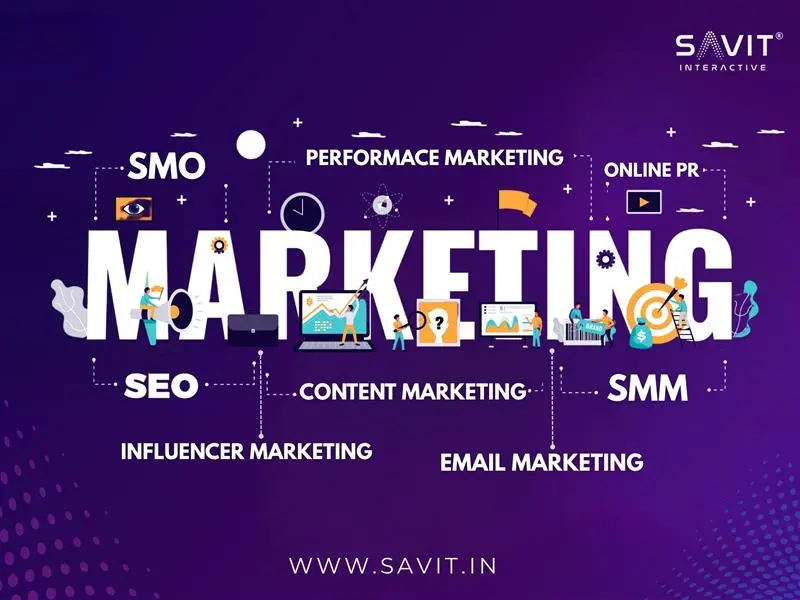
There are numerous ways to promote a business online. The suitable approach depends on your goals, intended audience, and budget. Below are the most commonly used types of digital marketing, each offering a different way to reach and engage with your customers:
- Search Engine Optimization (SEO)
Search engine optimization involves enhancing your website to achieve a higher ranking in Google search results. It helps people find your business when they search for something related to your services.
SEO is divided into three main parts:
- On-page SEO: This includes optimizing your website content, page titles, images, and internal links. It makes sure each page on your website is relevant and helpful to the visitor.
- Off-page SEO: This is about building trust for your website through backlinks from other sites. Increasing the number of quality links boosts your chances of achieving a higher ranking.
- Technical SEO: This deals with the backend setup of your website like loading speed, mobile-friendliness, secure connection (HTTPS), and proper site structure.
Many companies choose to work with a trusted SEO company India to handle all aspects of SEO properly.
- Pay-Per-Click Advertising (PPC)
Pay-per-click marketing is a paid form of advertising where you pay only when someone clicks on your ad. It provides quick traffic and is effective for those seeking immediate results.
PPC marketing includes:
- Search Ads: These appear on top of Google when someone searches for related terms. For example, if you search “buy shoes online,” the top results may be paid ads.
- Display Ads: These banner ads appear on other websites. They help increase brand awareness and retarget visitors.
- Social PPC: Platforms like Facebook, Instagram, and LinkedIn allow you to run ads based on age, interest, location, and more.
PPC helps you:
- Target the right audience quickly
- Control your ad spend
- Track results clearly
PPC marketing is highly effective for new product launches, driving sales, or directing traffic to landing pages.
- Content Marketing
Content marketing focuses on sharing valuable and useful information to attract people to your business. Instead of promoting directly, it builds trust by helping users first.
Common forms of content marketing:
- Blog Posts: Help users learn something or solve a problem
- Videos: Great for tutorials, product demos, or stories
- Infographics: Visual way to explain data or processes
- Guides and eBooks: Provide detailed knowledge on a topic
Why it works:
- Improves search visibility (good for SEO)
- Builds long-term trust with your audience
- Educates potential customers
A strong content marketing plan can turn visitors into loyal buyers over time.
- Social Media Marketing (SMM)
Social media marketing refers to the use of social media platforms to promote your business and engage with your audience.
It involves:
- Organic Posting: Sharing updates, tips, images, and videos to engage followers
- Paid Ads: Running ads targeted by age, location, interests, and behavior
- Engagement: Replying to comments, running polls, and building relationships
Benefits of social media marketing:
- Builds a strong brand identity
- Reaches both existing and new audiences
- Boosts website traffic and leads
Popular platforms: Instagram, Facebook, LinkedIn, Twitter, YouTube
- Social Media Optimization (SMO)
Social media optimization helps you improve the performance of your social media pages, without spending money on ads.
Key areas in SMO:
- Profile Setup: Use clear profile photos, cover images, and business details
- Hashtag Strategy: Utilize relevant and trending hashtags to enhance visibility.
- Timing: Post during your audience’s peak activity times.
- Content Planning: Use a mix of posts (images, reels, carousels, stories)
Social media optimization helps grow your followers organically and builds your online presence over time.
- Email Marketing
Email marketing allows you to directly connect with people who’ve shown interest in your business.
You can send:
- Newsletters with updates or blogs
- Promotional Offers or coupons
- Welcome Emails after signup
- Product Recommendations based on user activity
Benefits:
- Builds long-term relationships
- Cost-effective with high returns
- Can be automated for regular communication
Make sure to keep your emails short, useful, and not too frequent to avoid being marked as spam.
- Affiliate & Influencer Marketing
These are methods where others promote your business for you.
- Affiliate Marketing: You give someone a link to promote your product. If someone buys through that link, the promoter earns a small share.
- Influencer Marketing: You work with creators who have a strong following on Instagram, YouTube, or blogs. They promote your product to their audience, helping build trust.
These methods help reach new people fast, especially when you don’t have a large audience yet.
- Online PR
Online public relations (PR) involves overseeing your brand’s image and presence on digital platforms. It helps you build a strong reputation online and get featured on news websites, blogs, and other trusted platforms.
Key areas in Online PR:
- Press Releases: Writing and sharing news about your company’s achievements, launches, or milestones
- Media Coverage: Getting featured on high-authority websites to build trust
- Guest Blogging: Writing articles for industry websites (which also helps with search engine optimization)
- Review Management: Handling online reviews and ratings on platforms like Google, Facebook, and review websites
Benefits of Online PR:
- Builds brand authority and awareness
- Helps in improving SEO with quality backlinks
- Supports reputation management during crises or negative press
Many marketing agencies include Online PR as part of their overall strategy to strengthen your brand’s presence across the web.
How Digital Marketing Works: Channels & Strategy
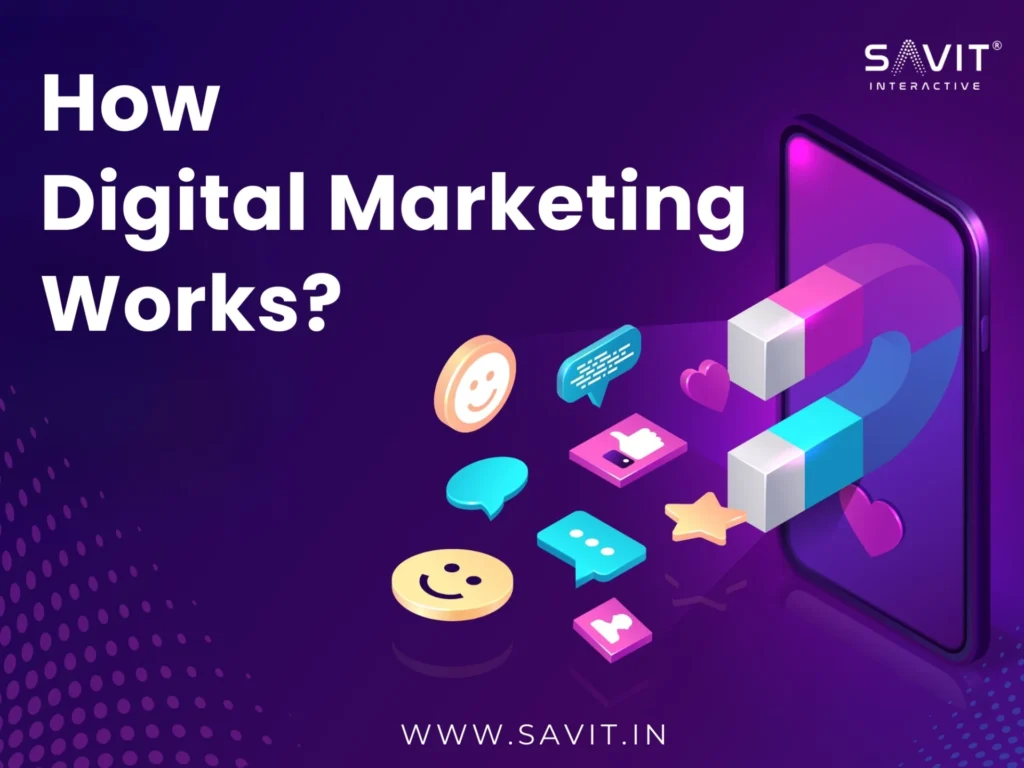
Digital marketing involves using different online channels to connect with the right people at the right time. The main goal is to attract visitors, convert them into leads or customers, and build long-term relationships. To gain a clearer understanding, let’s dissect this:
1. Channels of Digital Marketing
These are the platforms or tools used to reach people online. The three main types are:
- Owned Media: These are channels you control. It includes your website, blog, email list, and social media pages. You create and manage content here.
- Paid Media: These are platforms where you pay to show your ads. Examples consist of Google Ads, Facebook Ads, and sponsored articles.
- Earned Media: This is what others say about your brand, like reviews, mentions, shares, and media coverage. It builds trust and authority.
2. The Digital Marketing Funnel
Every visitor undergoes a journey before becoming a customer. Digital marketing strategies are built around this funnel:
- Awareness: At this stage, people first hear about your brand. Tools like social media marketing, blogs, and online PR help build awareness.
- Consideration: Now they want to know more. This is where content marketing, videos, and emails help in educating them.
- Conversion: This is when they engage in actions such as purchasing a product or completing a form. Pay-per-click marketing and well-designed landing pages help here.
- Retention: After conversion, you want them to stay loyal. Regular emails, offers, and quality service keep them engaged.
3. Strategy
Here’s how to develop your digital marketing strategy:
- Identify your target audience: Who do you wish to engage with? Understand their needs, habits, and the platforms they use.
- Set clear goals: Do you want more website traffic, sales, or leads? Your plan should match your goals.
- Pick the right channels: Use platforms that your audience uses. For instance, a fashion brand might emphasize Instagram, whereas a B2B organization could concentrate on SEO and LinkedIn.
- Create quality content: Whether it’s a blog, ad, or video, make sure it’s helpful and clear.
- Track and improve: Use tools like Google Analytics to check what’s working. Update and adjust based on performance.
Whether you’re doing it yourself or working with the best digital marketing agency, success depends on using the right channels, clear messaging, and consistent efforts.
Benefits of Digital Marketing for Businesses
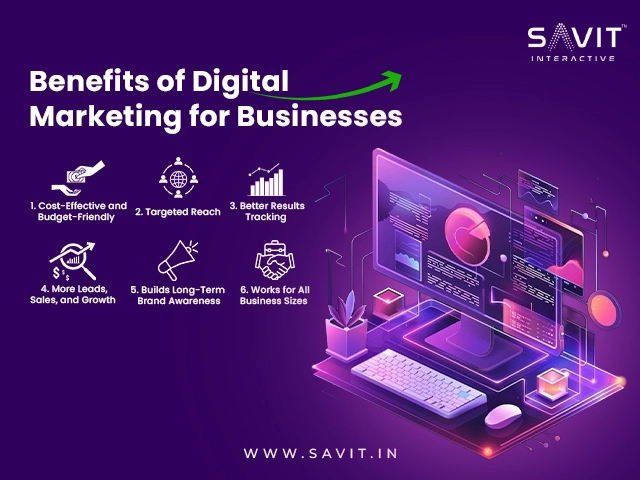
Digital marketing gives businesses a better way to connect with customers, promote their products, and grow — without spending heavily like traditional methods. Whether you’re a small startup or a large brand, the benefits are clear and impactful.
Let’s look at the main advantages:
1. Cost-Effective and Budget-Friendly
Unlike TV or newspaper ads, digital marketing services are affordable for all types of businesses. Even with a small budget, you can run ads, post content, and reach the right audience online
2. Targeted Reach
With tools like Google Ads and social media marketing, you can choose exactly who sees your message, based on age, location, interests, and more. This means you’re not wasting time or money on the wrong audience.
3. Better Results Tracking
You can measure every part of your campaign. From clicks to conversions, everything is visible. Platforms like Google Analytics help track results, so you can see what’s working and what needs improvement.
4. More Leads, Sales, and Growth
A well-planned digital marketing strategy brings people to your website, builds trust, and turns them into customers. Channels like content marketing, search engine optimization, and pay-per-click marketing all work together to boost your sales pipeline.
5. Builds Long-Term Brand Awareness
Regular posts, helpful blogs, and smart campaigns keep your brand in front of people. Over time, this creates strong brand recall and customer loyalty, especially when supported by marketing agencies.
6. Works for All Business Sizes
From local stores to big companies, anyone can use digital marketing. Even freelancers or individual creators can grow their brand using simple tools like social media optimization, blogs, or emails.
In short, digital marketing for beginners and experts alike brings measurable, fast, and lasting benefits, making it the go-to method for growing in the online world.
Digital Marketing vs. Traditional Marketing: A Brief Comparison
Both digital marketing and traditional marketing aim to promote a business and attract customers. But the way they work — and what they offer is very different. Here’s a simple table to compare them side by side:
| Aspect | Traditional Marketing | Digital Marketing |
| Reach | Mass audience via newspapers, TV, radio, billboards | Targeted reach through websites, social media marketing, and email |
| Cost | High production and placement costs | Cost-effective, suits all budgets; includes pay-per-click marketing |
| Targeting | Limited targeting options | Advanced targeting based on interests, location, age, and behavior |
| Tracking | Difficult to measure real-time results | Easy to track with tools; real-time data available |
| Flexibility | Once published or aired, changes are not possible | Can be edited, paused, or optimized anytime |
| Engagement | One-way communication; no direct feedback | Two-way interaction via comments, shares, messages, and reviews |
| Speed | Takes time to plan, print, or broadcast | Immediate launch possible with platforms like Google and Facebook |
| Return on Investment (ROI) | Hard to calculate ROI | Clear ROI tracking through analytics and conversion tools |
Who Should Use Digital Marketing?
The simple answer is anyone who wants to grow their business or personal brand online should use digital marketing. It works for every size and type of business, and even for individuals looking to build a strong online presence.
Let’s explore who will benefit the most:
1. Startups and New Businesses
If you’re just starting out, you need visibility fast. Digital marketing for beginners is easy to set up and budget-friendly. You can run ads, post content, or work on search engine optimization to bring in traffic quickly.
2. Small and Medium Businesses (SMBs)
Local shops, service providers, and home-based businesses can use digital marketing basics to compete with bigger players. From social media marketing to Google My Business listings, there are many tools to grow online.
3. Large Companies and Brands
Even established companies use digital marketing services to manage their reputation, run targeted ad campaigns, and connect with new audiences. Big brands often partner with the best digital marketing agency for large-scale execution.
4. Freelancers and Creators
Writers, designers, coaches, and influencers can promote their personal brand using content marketing, social media optimization, and email newsletters to grow their reach and client base.
5. Educational Institutes and Professionals
Colleges, tutors, and training centers can use digital marketing to reach students through SEO, online ads, and social platforms. Professionals like doctors, lawyers, and consultants can also benefit from strong local SEO and reviews.
No matter the size or industry, digital marketing helps everyone build an online presence, attract more people, and grow in a measurable way.
How to Do Digital Marketing (Beginner-Friendly Guide)
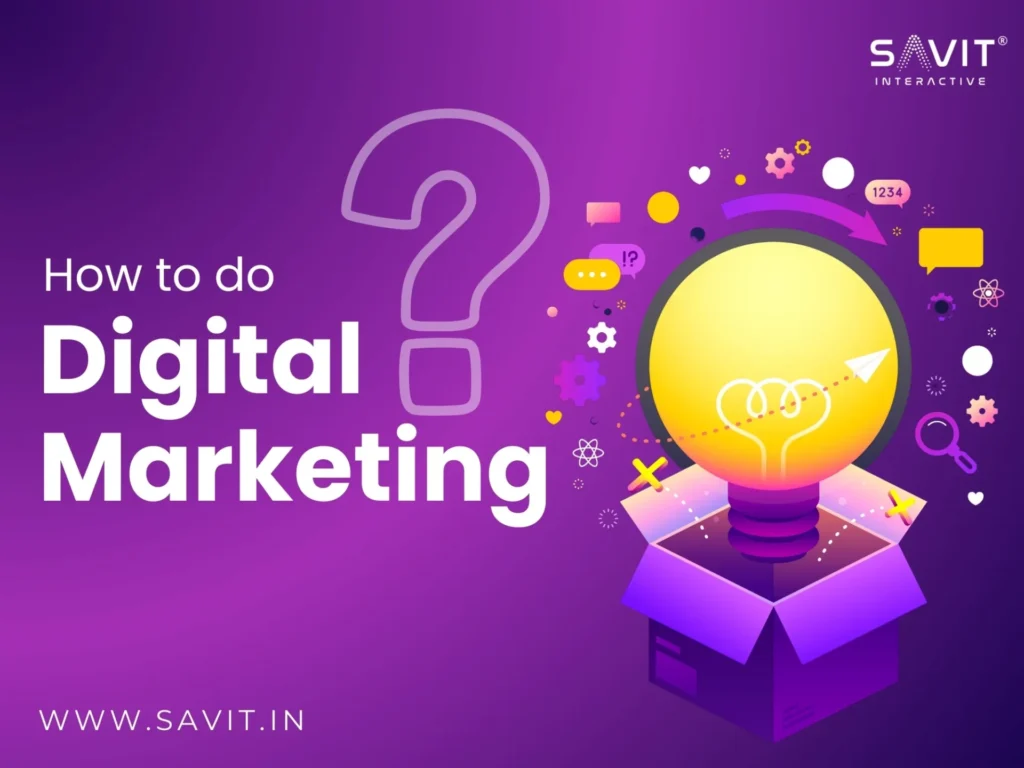
Getting started with digital marketing may seem overwhelming, but it becomes easy when you follow a step-by-step approach. Whether you’re a business owner, freelancer, or beginner, the guide below will help you understand how to start the right way.
Step 1: Set Clear Marketing Goals
Before you do anything, decide what you want to achieve. Your goals could be:
- More website traffic
- Higher sales
- More social media followers
- Better brand awareness
Clear goals shape your digital marketing plan effectively.
Step 2: Build a Strong Online Presence
Create a simple and mobile-friendly website that tells people who you are and what you offer. A properly designed website serves as the cornerstone for all digital marketing services, such as advertising and SEO.
Make sure to include:
- A homepage
- Services or product page
- Contact form
- Blog (optional but helpful for content marketing)
Step 3: Start with SEO and Content
Focus on search engine optimization from day one. Use relevant keywords, write helpful content, and make sure your site is easy to navigate.
Content marketing also plays a big role here — write blogs, create how-to guides, or make short videos that answer your audience’s questions.
Step 4: Use Paid and Social Channels
Once your basics are ready, try pay-per-click marketing or social media marketing to reach more people quickly.
- Run Google Ads to appear on top of search results
- Utilize Facebook and Instagram advertisements to reach your audience by specifying criteria such as age, location, or interests.
- Post regularly and keep your social media optimization in place — proper bio, profile photo, and hashtags
Step 5: Track Results and Improve
Utilize free tools such as Google Analytics and Search Console to monitor your performance. Look at how many people are visiting your site, where they come from, and what they do.
Based on the data:
- Improve your pages
- Adjust your ad spend
- Try different content formats
How to Choose the Right Digital Marketing Agency
Choosing the right partner to handle your online marketing can make a big difference in your results. Whether you’re a small business or a growing brand, the right digital marketing agency will help you reach the right people, improve performance, and save time.
Here are the key factors to consider when selecting the ideal digital marketing agency for your business:
1. Check Their Experience and Services
A good agency should offer key digital marketing services like SEO, content marketing, social media marketing, and PPC marketing. Ask how long they’ve been in the industry and what kind of clients they’ve worked with.
2. Ask for Case Studies or Work Samples
A reliable marketing agency should show examples of how they’ve helped businesses grow. Case studies showcase their effectiveness in achieving results.
3. Understand Their Strategy
The agency should understand your business and suggest a plan that fits your goals. If they jump straight into selling ads without learning about your brand, it’s a red flag.
4. See How They Measure Success
Make sure they offer reports and tracking. A professional SEO company in India, for example, will show ranking improvements, traffic growth, and leads generated. Clear reporting helps you understand what you’re paying for.
5. Know Their Team and Communication Style
A reliable agency should assign a team or account manager for your project. They should respond quickly, explain things clearly, and be open to feedback.
6. Compare Pricing, But Don’t Go Cheap
Price matters, but don’t choose the cheapest agency just to save money. Focus on value — the right team will help you earn more than you spend.
Conclusion: Build Your Brand the Digital Way
Today, being online is not just about having a website or posting occasionally. It’s about building real connections, staying visible, and offering value all through the right mix of digital marketing channels. From improving your search presence with search engine optimization, reaching new people through social media marketing, or driving fast results with pay-per-click marketing, each strategy plays a role in your growth journey.
How flexible, trackable, and cost-effective digital marketing makes it powerful, whether you’re a startup, freelancer, or a growing brand. It gives you the tools to compete smartly and scale at your own pace.
If you’re looking for expert support, Savit Interactive is a full-service digital marketing company in India helping businesses turn digital goals into growth. Whether it’s planning, execution, or performance tracking, our team is here to make marketing easier and more effective for you.
Frequently Asked Questions
What are the types of digital marketing?
The main types of digital marketing include search engine optimization, pay per click marketing, content marketing, social media marketing, email marketing, online PR, and influencer or affiliate marketing. Each type helps promote your business online differently, depending on your goals.
What role does SEO play in digital marketing?
SEO helps your website rank higher on search engines like Google, Yahoo, which brings more free and relevant traffic to your site over time.
Is digital marketing easy for beginners?
Yes, it is. With a clear plan and basic knowledge, anyone can start with digital marketing for beginners and build up step by step.
Can I handle digital marketing myself, or should I hire an agency?
If you’re starting out, you can manage the basics independently, like posting on social media or writing blogs. But to scale faster, track results properly, and stay ahead of competitors, working with the best digital marketing agency can save time and yield better results.
